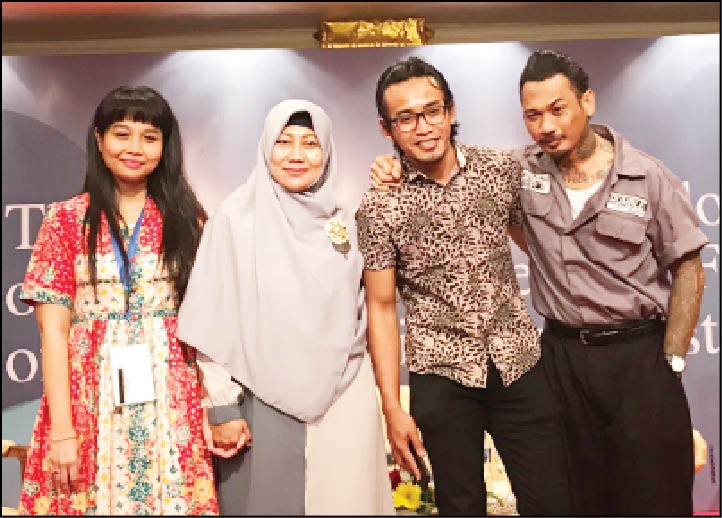(L-R) Saraswati Dewi, Hayati Eka Lakhsmi, Zulia Mahendra and I Gede Ari Astina (Jerinx) at a talk show titled ‘Bali and its Diversity’ held as part of a regional seminar and workshop organized by Journalists Association for Diversity (SEJUK), International Association of Religion Journalists and Institute for Peace and Democracy in March 2019. (Photo Courtesy: Twitter)

Survivors of the Bali bombings of 2002 speak of their journey to heal
Morung Express Feature
Bali (Indonesia) | April 1
For Hayati Eka Lakshmi, partner of a victim of the 2002 Bali bombings, and her two sons, reconciling with the past was not easy. But she took the step anyway when Ali Fauzi facilitated a meeting of her older son and the son of a perpetrator of the Bali bombings to explore an attempt at reconciliation.
Ali Fauzi is himself a former bomb maker for a terror network; now reformed, he runs the Peace Circle Foundation in an attempt to ‘de-radicalize’ youth in Indonesia. He is also the brother of Amrozi, one of the perpetrators of the October 2002 bombings. Amrozi was sentenced to death by an Indonesian court; he was executed by the state’s firing squad in 2008. His eldest son, Zulia Mahendra, remained bitter and angry for a long time, having seen the gunshot wound on his father’s dead body before his burial. He vowed revenge on state forces. The continuous stigma and discrimination he faced while growing up, as a “terrorist’s son,” did not help.
On the other hand was Alif, Hayati Eka Lakshmi’s older son who she protected from the gaze of the media and from the memories of the painful way in which Alif lost his father that night as two bombs exploded one after the other in Bali’s Kuta city stretch killing more than 200 people. Alif vowed to avenge his father’s death.
In 2017, Ali Fauzi attempted a face-to-face reconciliation meeting of Mahendra and Alif. Journalist for CNN Indonesia, Miftah Faridl, captured the process on camera; his film titled ‘Belajar Ikhlas Dari Penyintas’ (Learning Sincerity from Survivors) won the SEJUK Diversity Award 2018 and was screened at a regional seminar and workshop for journalists held here in March.
“This film was shot intending to give a voice to the survivors of the bombing,” said Faridl while speaking at a talk show on ‘Bali and its Diversity’ held as part of the seminar. He was accompanied by Zulia Mahendra, Hayati Eka Lakshmi and I Gede Ari Astina, aka Jerinx, a musician and activist, on the panel moderated by Saraswati Dewi, a lecturer at the University of Indonesia. “We hope the film will impact other survivors, to help them recover and reconcile,” maintained Faridl.
The reconciliation process between the two families ended with both families having found peace. Zulia Mahendra overcame desires of vengeance, and now works with former prisoners and terror combatants to shun violence and campaign for peace. For Hayati Eka Lakshmi, “I protected my sons for 15 years to recover and reconcile, and this was the perfect opportunity to finally heal our trauma and my sons’ yearning for revenge.” Having forgiven, Alif also found it in himself to move on, live again.
In the aftermath of the bombings, the band Superman Is Dead released the song ‘Kuta Rock City,’ as a tribute to the resilience of the people of Bali to progress despite the gaping hole that the bombings left in the city and in the hearts of the people. Today, a peace memorial stands at Ground Zero, where the bombs had left a crater, surrounded by music that refused to die.
“I lived 100 mts away from the bombing site at the time and saw humanity unite in Bali in its aftermath,” said Jerinx, the drummer of Superman Is Dead, who remains vocal against religious intolerance and for social justice. “There were many Muslim victims of the bombings and many Muslim doctors who treated the injured. All of us were victims and all of us survivors,” he asserted.
Having met Zulia Mahendra and Hayati Eka Lakshmi post reconciliation, Jerinx affirmed, “We must hold humanity above religion,” which supplemented Saraswati Dewi’s words, “The path for peace and reconciliation is arduous but in this time of violence, we must carry on.”






